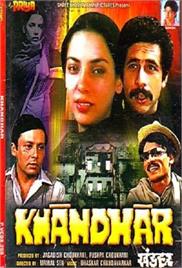Be Careful of Fake Websites. Always use HindiMovies.to domain & Join our Telegram Channel for Latest Updates.

Likes: 0
Views: 1.73K
Subhash is a photographer from the city, who has come to take pictures of some old temples and ruins in a village. Ruins fascinate him. While in the village, he gets acquainted with a young woman, Jamini, who has had her heart broken in the past, by another visitor from the big city. Will history repeat itself, or will she find a way out of the ruins at last?
Duration: 106 min
Released: 1984
IMDb Rating: 7.0/10 (128 Votes)
Genre: Drama, Hindi Movies
Stars: Annu Kapoor, Pankaj Kapur, Sreela Majumdar, Shabana Azmi
Directors: Mrinal Sen
Writers: Mrinal Sen, Premendra Mitra
Year: 1984
Server 1 – Dailymotion
Watch Part 1
Watch Part 2
Watch Part 3
Watch Part 4
Server 2 – Youtube
Khandhar (1984): A Cinematic Masterpiece Exploring Decay and Desire
Introduction
Khandhar is a critically acclaimed Hindi drama film released in 1984, directed by the masterful Mrinal Sen. Known for its deeply evocative storytelling, the film delves into themes of loneliness, decay, and unfulfilled human emotions, set against the haunting backdrop of a dilapidated mansion. Khandhar stands out as a profound exploration of human desires and societal neglect, helmed by some of the finest talents in Indian cinema.
Plot Summary
The narrative revolves around a deserted mansion, or "khandhar," which literally means "ruins" in Hindi. The story focuses on a solitary woman, Jamini, played by Shabana Azmi, who is left tending to this ancestral home that is slowly succumbing to decay—both structurally and metaphorically. Jamini's life is marked by isolation and longing, as she awaits the return of her former lover, now married and living away from the ruins.
An unexpected visitor, the young architect Satyavan (portrayed by Naseeruddin Shah), arrives to survey the mansion, which sets in motion a complex interplay of memories, desires, and emotional awakening. As Satyavan assesses the physical ruin, Jamini confronts her emotional desolation. Their interactions evoke subtle yet intense emotional currents, highlighting the tension between past and present, stagnation and change.
Main Cast
Director and Writer
Mrinal Sen, an iconic figure in Indian parallel cinema, directed Khandhar. His signature style, characterized by social awareness and poetic nuance, permeates the film. The screenplay was adapted from a short story by noted Bengali writer Sunil Gangopadhyay, whose literary sensibilities provide the narrative's rich emotional texture. The collaboration of Sen's direction and Gangopadhyay's storytelling crafts a film that is as intellectually stimulating as it is emotionally moving.
Thematic Exploration
Khandhar is not just a story about physical ruins; it metaphorically represents the erosion of relationships, hope, and identity. Through Jamini’s intense loneliness and the decaying mansion, the film paints a vivid picture of abandonment and forgotten pasts. The arrival of Satyavan introduces a subtle tension between the past and the future, as he embodies change and possibility.
The film poignantly explores the human condition—the yearning for connection, the pain of unfulfilled desires, and the resilience found even in desolation. Sen uses the stark visuals of the crumbling khandhar to reflect the internal crumbling psyche of its characters, especially Jamini.
Cinematography and Music
The cinematography by K. K. Mahajan plays a crucial role in establishing the film's somber tone. The haunting frames of the mansion’s dilapidated interiors and desolate landscapes visually underscore the themes of decay and solitude.
While Khandhar eschews the commercial Bollywood song-dance format, its background score subtly enhances the mood of the narrative. The music complements the film’s melancholic and reflective atmosphere without overshadowing the storytelling.
Critical Reception
Upon its release, Khandhar was lauded for its atmospheric direction, powerful performances, and thought-provoking narrative. It is regarded as a gem of Indian parallel cinema, appreciated by critics for its realistic portrayal and poetic depth. Shabana Azmi’s portrayal of Jamini is often cited as one of her career’s finest performances, her expressive subtlety bringing to life the character’s complex inner world.
The film also gained international recognition, showcasing the depth of Indian art cinema beyond the traditional Bollywood framework. Its compelling examination of human emotions amidst the ruins of time resonates universally, making it relevant even decades after its release.
Legacy
Khandhar remains a seminal work in the Indian cinematic landscape, especially within the realm of parallel cinema. It continues to be studied and appreciated for its artistic merits and profound social commentary. The film's poignant depiction of human isolation amid societal and familial decay holds enduring relevance.
Conclusion
Khandhar, directed by Mrinal Sen and starring the powerhouse duo of Shabana Azmi and Naseeruddin Shah, is an evocative exploration of memory, loneliness, and the passage of time. Its poetic realism and sensitive storytelling make it a must-watch for cinephiles interested in the depths of Indian cinema beyond mainstream entertainment. The film’s haunting narrative lingers long after the credits roll, inviting audiences to reflect upon the ruins in their own lives and societies.